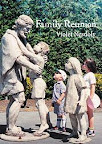
Title: Rich is a Religion: Breaking the Timeless Code to Wealth
Author: Mark Stevens
Publisher: Wiley, 2008, Hardcover, 192 pages
ISBN-10: 0470252871
ISBN-13: 978-0470252871
In Rich is a Religion: Breaking the Timeless Code to Wealth, multi-millionaire Mark Stevens imparts his philosophy of wealth. He likens it to a religion with
…a view of money that vests it with far more substance than a simple trading commodity. It is a way of thinking about money that has greater connectivity to what most of us place at the top of life’s hierarchy of values: family, friends, fulfillment, enrichment, and independence. (p. 10)
The book is interesting, loaded as it is with stories that illustrate his points. It is easy to understand for even infrequent visitors to the world of finance (moi). And it is to-the-point.
In the nine chapters that comprise the main part of the book Stevens extends the religion metaphor (e.g. chapter titles like “The Vision,” “The Congregation,” “The Atheists of the Religion of the Rich,” and “Metamorphosis”) and gives instructions on how to convert. Despite the religious symbolism, he does not advocate the worship of money but rather a relationship with it that resembles one’s relationship with religion – one made up of deeply held and faithfully followed convictions. To the brotherhood he promises at least an improvement in financial position if not outright wealth.
Some of the tenets of Stevens’ religion of the rich include the need to respect money and handle it with discipline and a sense of fiduciary control. He eschews using money and what it can buy to impress others (“Don’t care whether you are perceived as being rich or poor” p. 40). He warns against greed and taking undue risks with one’s livelihood and home. He recommends simplicity, contentment, humility (“Recognize that the most important money you have is the money no one can see” p. 158), smart management (“I have learned to make money while I sleep” p. 61) and realistic caution (“Never bet the farm” p. 101).
And to what end do we gain this wealth? “…To maximize the gift of life” p. 5, to achieve contentment (“The most rewarding achievement in life is to be content” p. 16), “…to extract the maximum pleasure from life…” p. 84. If there is anywhere I would quibble with Rich is a Religion's ideas, it would be in these regards. For though this is a book that gives wise advice about how to accumulate wealth for one’s time on earth, it lacks an eternal perspective on riches. As I read it, I kept thinking of the words of Jesus: “Do not lay up treasures on earth, where moth and rust destroy and where thieves break in and steal; but lay up for yourselves treasures in heaven” (Matthew 6:19-20). It’s not that this book is against these things. Stevens just never mentions them, leaving it for the reader to make their own connection. I suppose the astute reader will, though it’s awfully easy to lose sight of that perspective in the midst of all the motivation to gain material wealth for the here-and-now.
Stevens has earned his reputation as an expert by reason of his experience and success. His father died when he was a teenager, leaving the family with the grand total of $84. The fact that he came from that to his current multi-millionaire status and position of CEO of MSCO -- a results-driven management and marketing firm — by using the principles he explains in Rich is a Religion: Breaking the Timeless Code to Wealth, speaks eloquently of their power. More of his advice is available through other books he has authored (Your Marketing Sucks, Your Management Sucks, God is a Salesman) and via his Unconventional Thinking Blog.

0 comments:
Post a Comment